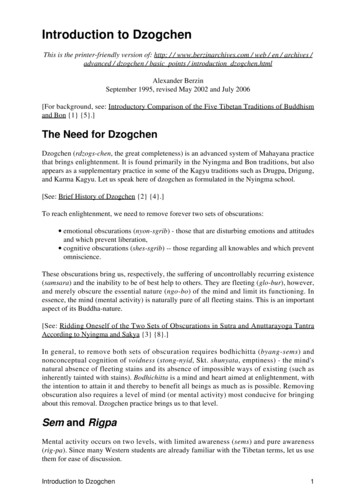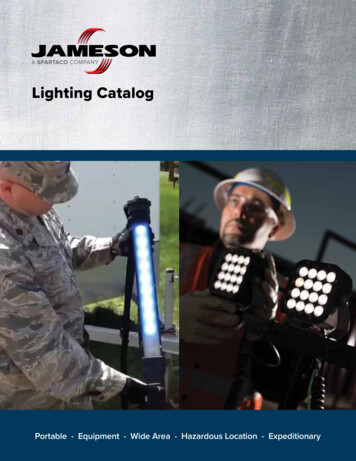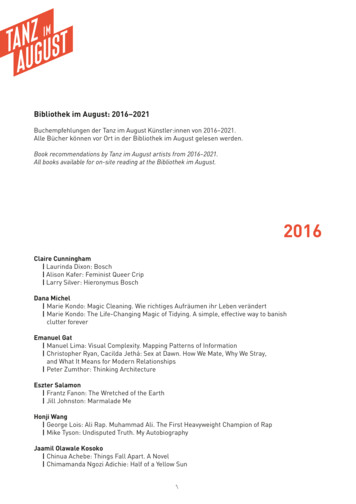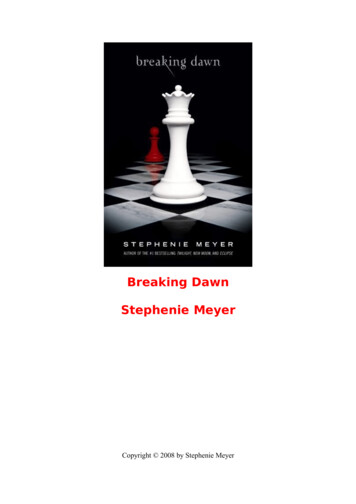
Transcription
William Faulkner LIGHT IN AUGUSTLIGHT IN AUGUSTWILLIAM FAULKNERVINTAGE BOOKSA DIVISION OF RANDOM HOUSE/NEW YORK1
William Faulkner LIGHT IN AUGUSTVINTAGE BOOKS EDITION, JANUARY 1972Copyright 1932, by William FaulknerCopyright Renewed 1959 by William FaulknerAll rights reserved under International and Pan-AmericanCopyright Conventions. Published in the United Statesby Random House, Inc., New York. Distributed in Canada byRandom House of Canada Limited, Toronto.Originally published byHarrison Smith and Robert Haas, in 1932.ISBN: 0-394-71189-0Library of Congress Catalog Card Number: 67-12716MANUFACTURED IN THE UNITED STATES OF AMERICA2
William Faulkner LIGHT IN AUGUSTPUBLISHER’S NOTEThe text of this edition of Light in August has been photographed from, and is therefore identicalwith, a copy of the first printing. Publication date was October 6, 1932.3
William Faulkner LIGHT IN AUGUSTContentsContentsChapter 1Chapter 2Chapter 3Chapter 4Chapter 5Chapter 6Chapter 7Chapter 8Chapter 9Chapter 10Chapter 11Chapter 12Chapter 13Chapter 14Chapter 15Chapter 16Chapter 17Chapter 18Chapter 19Chapter 20Chapter 21About the 791881992054
William Faulkner LIGHT IN AUGUSTChapter 1SITTING beside the road, watching the wagon mount the hill toward her, Lena thinks, ‘I have comefrom Alabama: a fur piece. All the way from Alabama a-walking. A fur piece.’ Thinking although Ihave not been quite a month on the road I am already in Mississippi, further from home than I have ever been before.I am now further from Doane’s Mill than I have been since I was twelve years old.She had never even been to Doane’s Mill until after her father and mother died, though six oreight times a year she went to town on Saturday, in the wagon, in a mail-order dress and her barefeet flat in the wagon bed and her shoes wrapped in a piece of paper beside her on the seat. Shewould put on the shoes just before the wagon reached town. After she got to be a big girl she wouldask her father to stop the wagon at the edge of town and she would get down and walk. She wouldnot tell her father why she wanted to walk in instead of riding. He thought that it was because of thesmooth streets, the sidewalks. But it was be cause she believed that the people who saw her andwhom she passed on foot would believe that she lived in the town too.When she was twelve years old her father and mother died in the same summer, in a log house ofthree rooms and a hall, without screens, in a room lighted by a bugswirled kerosene lamp, the nakedfloor worn smooth as old silver by naked feet. She was the youngest living child. Her mother diedfirst. She said, “Take care of paw.” Lena did so. Then one day her father said, “You go to Doane’sMill with McKinley. You get ready to go, be ready when he comes.” Then he died. McKinley, thebrother, arrived in a wagon. They buried the father in a grove behind a country church oneafternoon, with a pine headstone. The next morning she departed forever, though it is possible thatshe did not know this at the time, in the wagon with McKinley, for Doane’s Mill. The wagon wasborrowed and the brother had promised to return it by nightfall.The brother worked in the mill. All the men in the village. worked in the mill or for it. It wascutting pine. It had been there seven years and in seven years more it would destroy all the timberwithin its reach. Then some of the machinery and most of the men who ran it and existed becauseof and for it would be loaded onto freight cars and moved away. But some of the machinery wouldbe left, since new pieces could always be bought on the installment plan—gaunt, staring, motionlesswheels rising from mounds of brick rubble and ragged weeds with a quality profoundly astonishing,and gutted boilers lifting their rusting and unsmoking stacks with an air stubborn, baffled andbemused upon a stumppocked scene of profound and peaceful desolation, unplowed, untilled,gutting slowly into red and choked ravines beneath the long quiet rains of autumn and the gallopingfury of vernal equinoxes. Then the hamlet which at its best day had borne no name listed onPostoffice Department annals would not now even be remembered by the hookwormridden heirsat-large who pulled the buildings down and buried them in cookstoves and winter grates.There were perhaps five families there when Lena arrived. There was a track and a station, andonce a day a mixed train fled shrieking through it. The train could be stopped with a red flag, but byordinary it appeared out of the devastated hills with apparitionlike suddenness and wailing like abanshee, athwart and past that little less-than-village like a forgotten bead from a broken string. Thebrother was twenty years her senior. She hardly remembered him at all when she came to live withhim. He lived in a four room and unpainted house with his labor- and child-ridden wife. For almosthalf of every year the sister-in-law was either lying in or recovering. During this time Lena did all thehousework and took care of the other children. Later she, told herself, ‘I reckon that’s why I got oneso quick myself.’She slept in a lean-to room at the back of the house. It had a window which she learned to openand close again in the dark without making a sound, even though there also slept in the lean-to roomat first her oldest nephew and then the two oldest and then the three. She had lived there eight years5
William Faulkner LIGHT IN AUGUSTbefore she opened the window for the first time. She had not opened it a dozen times hardly beforeshe discovered that she should not have opened it at all. She said to herself, ‘That’s just my luck.’The sister-in-law told the brother. Then he remarked her changing shape, which he should havenoticed some time before. He was a hard man. Softness and gentleness and youth (he was just forty)and almost everything else except a kind of stubborn and despairing fortitude and the bleak heritageof his bloodpride had been sweated out of him. He called her whore. He accused the right man(young bachelors, or sawdust Casanovas anyway, were even fewer in number than families) but shewould not admit it, though the man had departed six months ago. She just repeated stubbornly,“He’s going to send for me. He said he would send for me”; unshakable, sheeplike, having drawnupon that reserve of patient and steadfast fidelity upon which the Lucas Burches depend and trust,even though they do not intend to be present when the need for it arises. Two weeks later sheclimbed again through the window. It was a little difficult, this time. ‘If it had been this hard to dobefore, I reckon I would not be doing it now,’ she thought. She could have departed by the door, bydaylight. Nobody would have stopped her. Perhaps she knew that. But she chose to go by night, andthrough the window. She carried a palm leaf fan and a small bundle tied neatly in a bandannahandkerchief. It contained among other things thirty-five cents in nickels and dimes. Her shoes werea pair of his own which her brother had given to her. They were but slightly worn, since in thesummer neither of them wore shoes at all. When she felt the dust of the road beneath her feet sheremoved the shoes and carried them in her hand.She had been doing that now for almost four weeks. Behind her the four weeks, the evocation offar, is a peaceful corridor paved with unflagging and tranquil faith and peopled with kind andnameless faces and voices: Lucas Burch? I don’t know. I don’t know of anybody by that name around here. Thisroad? It goes to Pocahontas. He might be there. It’s possible. Here’s a wagon that’s going a piece of the way. It willtake you that far; backrolling now behind her a long monotonous succession of peaceful andundeviating changes from day to dark and dark to day again, through which she advanced inidentical and anonymous and deliberate wagons as though through a succession of creakwheeledand limpeared avatars, like something moving forever and without progress across an urn.The wagon mounts the hill toward her. She passed it about a mile back down the road. It wasstanding beside the road, the mules asleep in the traces and their heads pointed in the direction inwhich she walked. She saw it and she saw the two men squatting beside a barn beyond the fence.She looked at the wagon and the men once: a single glance all-embracing, swift, innocent andprofound. She did not stop; very likely the men beyond the fence had not seen her even look at thewagon or at them. Neither did she look back. She went on out of sight, walking slowly, the shoesunlaced about her ankles, until she reached the top of the hill a mile beyond. Then she sat down onthe ditchbank, with her feet in the shallow ditch, and removed the shoes. After a while she began tohear the wagon. She heard it for some time. Then it came into sight, mounting the hill.The sharp and brittle crack and clatter of its weathered and ungreased wood and metal is slowand terrific: a series of dry sluggish reports carrying for a half mile across the hot still pinewineysilence of the August afternoon. Though the mules plod in a steady and unflagging hypnosis, thevehicle does not seem to progress. It seems to hang suspended in the middle distance forever andforever, so infinitesimal is its progress, like a shabby bead upon the mild red string of road. So muchis this so that in the watching of it the eye loses it as sight and sense drowsily merge and blend, likethe road itself, with all the peaceful and monotonous changes between darkness and day, like alreadymeasured thread being rewound onto a spool. So that at last, as though out of some trivial andunimportant region beyond even distance, the sound of it seems to come slow and terrific andwithout meaning, as though it were a ghost travelling a half mile ahead of its own shape. ‘That farwithin my hearing before my seeing,’ Lena thinks. She thinks of herself as already moving, ridingagain, thinking then it will be as if I were riding for a half mile before I even got into the wagon, before the wagon6
William Faulkner LIGHT IN AUGUSTeven got to where I was waiting, and that when the wagon is empty of me again it will go on for a half mile with mestill in it. She waits, not even watching the wagon now, while thinking goes idle and swift andsmooth, filled with nameless kind faces and voices: Lucas Burch? You say you tried in Pocahontas? Thisroad? It goes to Springvale. You wait here. There will be a wagon passing soon that will take you as far as it goes.Thinking, ‘And if he is going all the way to Jefferson, I will be riding. within the hearing of LucasBurch before his seeing. He will hear the wagon, but he won’t know. So there will be one within hishearing before his seeing. And then he will see me and he will be excited. And so there will be twowithin his seeing before his remembering.’While Armstid and Winterbottom were squatting against the shady wall of Winterbottom’s stable,they saw her pass in the road. They saw at once that she was young, pregnant, and a stranger. “Iwonder where she got that belly,” Winterbottom said.“I wonder how far she has brought it afoot,” Armstid said.“Visiting somebody back down the road, I reckon,” Winterbottom said.“I reckon not. Or I would have heard. And it ain’t nobody up my way, neither. I would haveheard that, too.”“I reckon she knows where she is going,” Winterbottom said. “She walks like it.”“She’ll have company, before she goes much further,” Armstid said. The woman had now goneon, slowly, with her swelling and unmistakable burden. Neither of them had seen her so much asglance at them when she passed in a shapeless garment of faded blue, carrying a palm leaf fan and asmall cloth bundle. “She ain’t come from nowhere close,” Armstid said. “She’s hitting that lick likeshe’s been at it for a right smart while and had a right smart piece to go yet.”“She must be visiting around here somewhere,” Winterbottom said.“I reckon I would have heard about it,” Armstid said. The woman went on. She had not lookedback. She went out of sight up the road: swollen, slow, deliberate, unhurried and tireless asaugmenting afternoon itself. She walked out of their talking too; perhaps out of their minds too.Because after a while Armstid said what he had come to say. He had already made two previoustrips, coming in his wagon five miles and squatting and spitting for three hours beneath the shadywall of Winterbottom’s barn with the timeless unhaste and indirection of his kind, in order to say it.It was to make Winterbottom an offer for a cultivator which Winterbottom wanted to sell. At lastArmstid looked at the sun and offered the price which he had decided to offer while lying in bedthree nights ago. “I know of one in Jefferson I can buy at that figure,” he said.“I reckon you better buy it,” Winterbottom said. “It sounds like a bargain.”“Sho,” Armstid said. He spat. He looked again at the sun, and rose. “Well, I reckon I better geton toward home.”He got into his wagon and waked the mules. That is, he put them into motion, since only a negrocan tell when a mule is asleep or awake. Winterbottom followed him to the fence, leaning his armson the top rail. “Yes, sir,” he said. “I’d sho buy that cultivator at that figure. If you don’t take it, I bedog if I ain’t a good mind to buy it, myself, at that price. I reckon the fellow that owns it ain’t got aspan of mules to sell for about five dollars, has he?”“Sho,” Armstid said. He drove on, the wagon beginning to fall into its slow and mile-consumingclatter. Neither does he look back. Apparently he is not looking ahead either, because he does notsee the woman sitting in the ditch beside the road until the wagon has almost reached the top of thehill. In the instant in which he recognises the blue dress he cannot tell if she has ever seen the wagonat all. And no one could have known that he had ever looked at her either as, without any semblanceof progress in either of them, they draw slowly together as the wagon crawls terrifically toward herin its slow palpable aura of somnolence and red dust in which the steady feet of the mules move7
William Faulkner LIGHT IN AUGUSTdreamlike and punctuate by the sparse jingle of harness and the limber bobbing of jackrabbit ears,the mules still neither asleep nor awake as he halts them.From beneath a sunbonnet of faded blue, weathered now by other than formal soap and water,she looks up at him quietly and pleasantly: young, pleasantfaced, candid, friendly, and alert. She doesnot move yet. Beneath the faded garment of that same weathered blue her body is shapeless andimmobile. The fan and the bundle lie on her lap. She wears no stockings. Her bare feet rest side byside in the shallow ditch. The pair of dusty, heavy, manlooking shoes beside them are not moreinert. In the halted wagon Armstid sits, humped, bleacheyed. He sees that the rim of the fan isbound neatly in the same faded blue as the sunbonnet and the dress.“How far you going?” he says.“I was trying to get up the road a pieceways before dark,” she says. She rises and takes up theshoes. She climbs slowly and deliberately into the road, approaching the wagon. Armstid does notdescend to help her. He merely holds the team still while she climbs heavily over the wheel and setsthe shoes beneath the seat. Then the wagon moves on. “I thank you,” she says. “It was right tiringafoot.”Apparently Armstid has never once looked full at her. Yet he has already seen that she wears nowedding ring. He does not look at her now. Again the wagon settles into its slow clatter. “How faryou come from?” he says.She expels her breath. It is not a sigh so much as a peaceful expiration, as though of peacefulastonishment. “A right good piece, it seems now. I come from Alabama.”“Alabama? In your shape? Where’s your folks?”She does not look at him, either. “I’m looking to meet him up this way. You might know him.His name is Lucas Burch. They told me back yonder a ways that he is in Jefferson, working for theplaning mill.”“Lucas Burch.” Armstid’s tone is almost identical with hers. They sit side by side on the saggingand brokenspringed seat. He can see her hands upon her lap and her profile beneath the sunbonnet;from the corner of his eye he sees it. She seems to be watching the road as it unrolls between thelimber ears of the mules. “And you come all the way here, afoot, by yourself, hunting for him?”She does not answer for a moment. Then she says: “Folks have been kind. They have been rightkind.”“Womenfolks too?” From the corner of his eye he watches her profile, thinking I don’t know whatMartha’s going to say thinking, ‘I reckon I do know what Martha’s going to say. I reckon womenfolksare likely to be good without being very kind. Men, now, might. But it’s only a bad woman herselfthat is likely to be very kind to another woman that needs the kindness’ thinking Yes I do. I knowexactly what Martha is going to say.She sits a little forward, quite still, her profile quite still, her cheek. “It’s a strange thing,” she says.“How folks can look at a strange young gal walking the road in your shape and know that herhusband has left her?” She does not move. The wagon now has a kind of rhythm, its ungreased andoutraged wood one with the slow afternoon, the road, the heat. “And you aim to find him up here.”She does not move, apparently watching the slow road between the ears of the mules, thedistance perhaps roadcarved and definite. “I reckon I’ll find him. It won’t be hard. He’ll be wherethe most folks are gathered together, and the laughing and joking is. He always was a hand for that.”Armstid grunts, a sound savage, brusque. “Get up, mules,” he says; he says to himself, betweenthinking and saying aloud: ‘I reckon she will. I reckon that fellow is fixing to find that he made a badmistake when he stopped this side of Arkansas, or even Texas.’The sun is slanting, an hour above the horizon now, above the swift coming of the summernight. The lane turns from the road, quieter even than the road. “Here we are,” Armstid says.8
William Faulkner LIGHT IN AUGUSTThe woman moves at once. She reaches down and finds the shoes; apparently she is not evengoing to delay the wagon long enough to put them on. “I thank you kindly,” she says. “It was ahelp.”The wagon is halted again. The woman is preparing to descend. “Even if you get to Varner’sstore before sundown, you’ll still be twelve miles from Jefferson,” Armstid says.She holds the shoes, the bundle, the fan awkwardly in one hand, the other free to help her down.“I reckon I better get on,” she says.Armstid does not touch her. “You come on and stay the night at my house,” he says; “wherewomenfolks—where a woman can . if you—You come on, now. I’ll take you on to Varner’s firstthing in the morning, and you can get a ride into town. There will be somebody going, on aSaturday. He ain’t going to get away on you overnight. If he is in Jefferson at all, he will still be theretomorrow.”She sits quite still, her possessions gathered into her hand for dismounting. She is looking ahead,to where the road curves on and away, crossslanted with shadows. “I reckon I got a few days left.”“Sho. You got plenty of time yet. Only you are liable to have some company at any time now thatcan’t walk. You come on home with me.” He puts the mules into motion without waiting for areply. The wagon enters the lane, the dim road. The woman sits back, though she still holds the fan,the bundle, the shoes.“I wouldn’t be beholden,” she says. “I wouldn’t trouble.”“Sho,” Armstid says. “You come on with me.” For the first time the mules move swiftly of theirown accord. “Smelling corn,” Armstid says, thinking, ‘But that’s the woman of it. Her own self oneof the first ones to cut the ground from under a sister woman, she’ll walk the public country herselfwithout shame because she knows that folks, menfolks, will take care of her. She don’t care nothingabout womenfolks. It wasn’t any woman that got her into what she don’t even call trouble. Yes, sir.You just let one of them get married or get into trouble without being married, and right then andthere is where she secedes from the woman race and species and spends the balance of her lifetrying to get joined up with the man race. That’s why they dip snuff and smoke and want to vote.’When the wagon passes the house and goes on toward the barnlot, his wife is watching it fromthe front door. He does not look in that direction; he does not need to look to know that she will bethere, is there. ‘Yes,’ he thinks with sardonic ruefulness, turning the mules into the open gate, ‘Iknow exactly what she is going to say. I reckon I know exactly.’ He halts the wagon, he does notneed to look to know that his wife is now in the kitchen, not watching now; just waiting. He haltsthe wagon. “You go on to the house,” he says; he has already descended and the woman is nowclimbing slowly down, with that inward listening deliberation. “When you meet somebody, it will beMartha. I’ll be in when I feed the stock.” He does not watch her cross the lot and go on toward thekitchen. He does not need to. Step by step with her he enters the kitchen door also and comes uponthe woman who now watches the kitchen door exactly as she had watched the wagon pass from thefront one. ‘I reckon I know exactly what she will say,’ he thinks.He takes the team out and waters and stalls and feeds them, and lets the cows in from thepasture. Then he goes to the kitchen. She is still there, the gray woman with a cold, harsh, irascibleface, who bore five children in six years and raised them to man—and womanhood. She is not idle.He does not look at her. He goes to the sink and fills a pan from the pail and turns his sleeves back.“Her name is Burch,” he says. “At least that’s what she says the fellow’s name is that she is huntingfor. Lucas Burch. Somebody told her back down the road a ways that he is in Jefferson now.” Hebegins to wash, his back to her. “She come all the way from Alabama, alone and afoot, she says.”Mrs. Armstid does not look around. She is busy at the table. “She’s going to quit being alone agood while before she sees Alabama again,” she says.9
William Faulkner LIGHT IN AUGUST“Or that fellow Burch either, I reckon.” He is quite busy at the sink, with the soap and water.And he can feel her looking at him, at the back of his head, his shoulders in the shirt of sweatfadedblue. “She says that somebody down at Samson’s told her there is a fellow named Burch orsomething working at the planing mill in Jefferson.”“And she expects to find him there. Waiting. With the house all furnished and all.”He cannot tell from her voice if she is watching him or not now. He towels himself with a splitfloursack. “Maybe she will. If it’s running away from her he’s after, I reckon he’s going to find outhe made a bad mistake when he stopped before he put the Mississippi River between them.” Andnow he knows that she is watching him: the gray woman not plump and not thin, manhard,workhard, in a serviceable gray garment worn savage and brusque, her hands on her hips, her facelike those of generals who have been defeated in battle.“You men,” she says.“What do you want to do about it? Turn her out? Let her sleep in the barn maybe?”“You men,” she says. “You durn men.”They enter the kitchen together, though Mrs. Armstid is in front. She goes straight to the stove.Lena stands just within the door. Her head is uncovered now, her hair combed smooth. Even theblue garment looks freshened and rested. She looks on while Mrs. Armstid at the stove clashes themetal lids and handles the sticks of wood with the abrupt savageness of a man. “I would like tohelp,” Lena says.Mrs. Armstid does not look around. She clashes the stove savagely. “You stay where you are.You keep off your feet now, and you’ll keep off your back a while longer maybe.”“It would be a beholden kindness to let me help.”“You stay where you are. I been doing this three times a day for thirty years now. The time whenI needed help with it is done passed.” She is busy at the stove, not backlooking. “Armstid says yourname is Burch.”“Yes,” the other says. Her voice is quite grave now, quite quiet. She sits quite still, her handsmotionless upon her lap. And Mrs. Armstid does not look around either. She is still busy at thestove. It appears to require an amount of attention out of all proportion to the savage finality withwhich she built the fire. It appears to engage as much of her attention as if it were an expensivewatch.“Is your name Burch yet?” Mrs. Armstid says.The young woman does not answer at once. Mrs. Armstid does not rattle the stove now, thoughher back is still toward the younger woman. Then she turns. They look at one another, suddenlynaked, watching one another: the young woman in the chair, with her neat hair and her inert handsupon her lap, and the older one beside the stove, turning, motionless too, with a savage screw ofgray hair at the base of her skull and a face that might have been carved in sandstone. Then theyounger one speaks.“I told you false. My name is not Burch yet. It’s Lena Grove.”They look at one another. Mrs. Armstid’s voice is neither cold nor warm. It is not anything at all.“And so you want to catch up with him so your name will be Burch in time. Is that it?”Lena is looking down now, as though watching her hands upon her lap. Her voice is quiet,dogged. Yet it is serene. “I don’t reckon I need any promise from Lucas. It just happenedunfortunate so, that he had to go away. His plans just never worked out right for him to come backfor me like he aimed to. I reckon me and him didn’t need to make word promises. When he foundout that night that he would have to go, he—”“Found out what night? The night you told him about that chap?”10
William Faulkner LIGHT IN AUGUSTThe other does not answer for a moment. Her face is calm as stone, but not hard. Its doggednesshas a soft quality, an inwardlighted quality of tranquil and calm unreason and detachment. Mrs.Armstid watches her. Lena is not looking at the other woman while she speaks. “He had done gotthe word about how he might have to leave a long time before that. He just never told me soonerbecause he didn’t want to worry me with it. When he first heard about how he might have to leave,he knowed then it would be best to go, that he could get along faster somewhere where the foremanwouldn’t be down on him. But he kept on putting it off. But when this here happened, we couldn’tput it off no longer then. The foreman was down on Lucas because he didn’t like him because Lucaswas young and full of life all the time and the foreman wanted Lucas’ job to give it to a cousin ofhis. But he hadn’t aimed to tell me because it would just worry me. But when this here happened, wecouldn’t wait any longer. I was the one that said for him to go. He said he would stay if I said so,whether the foreman treated him right or not. But I said for him to go. He never wanted to go, eventhen. But I said for him to. To just send me word when he was ready for me to come. And then hisplans just never worked out for him to send for me in time, like he aimed. Going away amongstrangers like that, a young fellow needs time to get settled down. He never knowed that when heleft, that he would need more time to get settled down in than he figured on. Especially a youngfellow full of life like Lucas, that likes folks and jollifying, and liked by folks in turn. He didn’t knowit would take longer than he planned, being young, and folks always after him because he is a handfor laughing and joking, interfering with his work unbeknownst to him because he never wanted tohurt folks’ feelings. And I wanted him to have his last enjoyment, because marriage is different witha young fellow, a lively young fellow, and a woman. It lasts so long with a lively young fellow. Don’tyou think so?”Mrs. Armstid does not answer. She looks at the other sitting in the chair with her smooth hairand her still hands lying upon her lap and her soft and musing face. “Like as not, he already sent methe word and it got lost on the way. It’s a right far piece from here to Alabama even, and I ain’t toJefferson yet. I told him I would not expect him to write, being as he ain’t any hand for letters. ‘Youjust send me your mouthword when you are ready for me,’ I told him. ‘I’ll be waiting.’ It worried mea little at first, after he left, because my name wasn’t Burch yet and my brother and his folks notknowing Lucas as well as I knew him. How could they?” Into her face there comes slowly anexpression of soft and bright surprise, as if she had just thought of something which she had noteven been aware that she did not know. “How could they be expected to, you see. But he had to getsettled down first; it was him would have all the trouble of being among strangers, and me withnothing to bother about except to just wait while he had all the bother and trouble. But after a whileI reckon I just got too busy getting this chap up to his time to worry about what my name was orwhat folks thought. But me and Lucas don’t need no word promises between us. It was somethingunexpected come up, or he even sent the word and it got lost. So one day I just decided to up andnot wait any longer.”“How did you know which way to go when you started?”Lena is watching her hands. They are moving now, plaiting with rapt bemusement a fold of herskirt. It is not diffidence, shyness. It is apparently some musing reflex of the hand alone. “I just keptasking. With Lucas a lively young fellow that got to know folks easy and quick, I knew that whereverhe had been, folks would remember him. So I kept asking. And folks was right kind. And sureenough, I heard two days back on the road that he is in Jefferson, working for the planing mill.”Mrs. Armstid watches the lowered face. Her hands are on her hips and she watches the youngerwoman with an expression of cold and impersona
William Faulkner LIGHT IN AUGUST 3 PUBLISHER’S NOTE The text of this edition of Light in August has been photographed from, and is therefore identical with, a copy of










